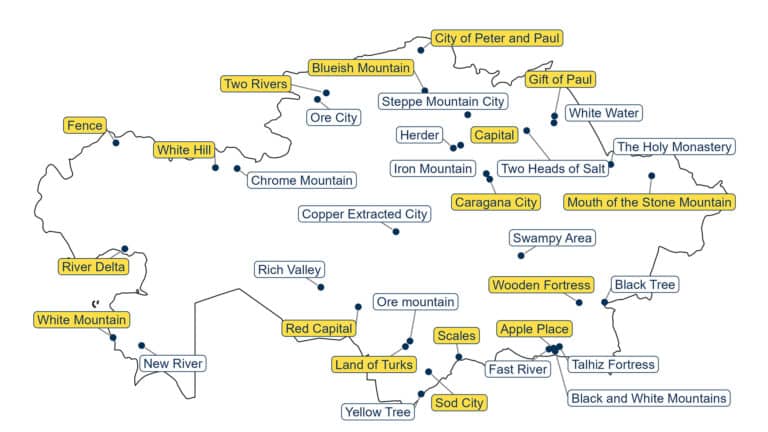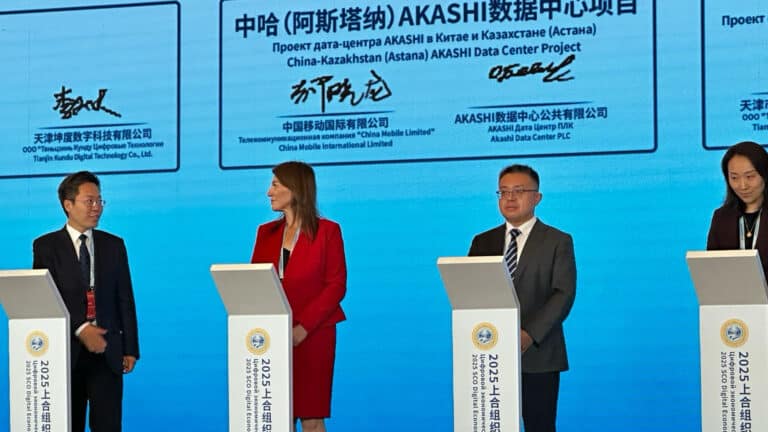
The U.S. company PSQ Holdings, also known as PublicSquare, brands itself as a marketplace for family-oriented, patriotic and politically conservative Americans. Three years ago, it was just an idea, a few lines of code, and seven employees. “We will become the new Amazon,” proclaims its founder, Michael Seifert. While the business has indeed grown significantly since its inception, PSQ has yet to turn a profit and recently saw downward revisions to analyst performance forecasts.
A ‘patriotic’ alternative
The PSQ Holdings business consists of three key divisions: the PublicSquare marketplace, the payments system Credova, and the premium diaper and baby wipe brand EveryLife.
The company was founded in 2021 by Michael Seifert. He identifies himself with “red America” — a term used for areas that predominantly vote Republican, the party that has selected Donald Trump as its presidential candidate in three consecutive election cycles. “I think the markets, especially red America, that loves the country, and the Constitution and the values that it protects, we’re really tired of feeling lectured [to] by companies that hate us,” Seifert said in an interview with Breitbart News.
The business, according to Seifert, is based on values such as family, freedom, a strong nation, support for small businesses, and a commitment to the Constitution. He contrasts these with “corrupt philosophies.” For instance, in his interview with Breitbart News, he mentioned that the company is against abortion and stands as the “starting point” to countering corporate policies emphasizing environmental, social, and governance (ESG) and diversity, equity, and inclusion (DEI) concerns.
The company’s story begins in January 2021, when Seifert and his wife made a list of businesses with traditional values that they “could feel confident supporting,” Seifert recalled on the She Thinks podcast. The couple shared this list with friends and put it in Facebook groups, and it became popular. This led them to the idea of creating a directory where consumers could find alternatives to major brands like Adidas, Levi’s, etc. They chose to name it PublicSquare, a concept that Seifert, who studied political science at university, was “enthralled with.”
On October 1, 2021, the app was test-launched in San Diego County, merely providing links to companies that were “ideologically aligned.” To make a purchase, users had to visit the seller’s website. In 2022, on July 4, U.S. Independence Day, the marketplace went nationwide. By January 2024, PublicSquare had 1.6 million consumer members and 71,000 businesses. From June 1, 2022, to December 31, 2023, according to the company, monthly customer growth was 22%, while monthly business registrations grew at a rate of 12%.
Seifert sees his business as part of an emerging “parallel economy.” He estimates its potential size at 30% of the U.S. economy, having calculated the GDP of all the counties that voted for Trump in 2020 (for reference, U.S. GDP was $27.36 trillion in 2023).
Monetizing values
Such radical ideas do not appeal to everyone. For example, the San Diego Union Tribune newspaper referred to PublicSquare as “a threat to public health,” Seifert told the University of Texas student publication the Texas Horn. The Daily Mail tabloid called the company the “America First” marketplace, a reference to one of Trump’s campaign slogans.
To register on the PublicSquare platform, companies must agree to respect the platform’s core values and submit themselves to a vetting of their public history. Consumers who want to register on the platform, meanwhile, are not subject to any scrutiny. Registration is free for both companies and consumers.
PublicSquare generates revenue through advertising. Companies can purchase a monthly subscription or choose items “a la carte,” according to the company’s 2023 report. Additionally, the platform allows companies to offer business-to-business services. PublicSquare helps them to find each other by sending emails and push notifications, in return earning referral fees.
The new Amazon?
In July 2023, Seifert said that the company was on its way to becoming “the new Amazon.”
Such ambitious plans require investment. Initially, PSQ Holdings grew through loans and selling equity stakes directly to investors, as stated in its 2023 report. This helped the company to raise more than $20 million, with one of its investors being Donald Trump Jr. In company documents, he is also listed as an advisor. He has signed a lock-up agreement not to sell shares until the second half of 2025.
In 2023, PublicSquare went public through a merger with the SPAC Colombier Acquisition Corp., raising about $34.9 million before expenses. At the time, the IPO market was dead and SPACs were nearly extinct, notes Forbes. Seifert told the publication that he planned to use the proceeds from the listing to further develop the website, launch proprietary products, and expand marketing efforts.
Before going public, PublicSquare spent little on advertising. Now, however, it collaborates with over 1,200 influencers. Among them is commentator Tucker Carlson, who agreed to promote PublicSquare on his Twitter (now X) for $1 million, Forbes reported. Donald Trump Jr. also has participated in company-organized events. In May 2024, the company announced a partnership with Erin Elmore, an official spokesperson for Trump’s campaign.
A billion-dollar plan
Since going public in July 2023, PSQ Holdings stock has dropped more than 70% to $2.69 per share.
Recently, the only analyst covering the company downgraded their forecasts, according to Simply Wall St. Expected revenue for 2024 was revised lower from $29 million to $24 million, while the target price for the stock was cut 33% to $5.00 per share. The expected loss per share worsened, going from $1.27 to $1.62. Based on the current share price, there is about 85% upside for the stock. Simply Wall St cautions that shareholder equity in PublicSquare has been diluted over the last year, the company lacks a “meaningful” market capitalization, and profitability is not expected to be achieved within the next three years.
In 2023, the company’s net revenue came in at $5.7 million, with a net loss of $53.3 million, versus a $7.0 million loss in 2022. The company attributed the ballooning loss to growth in the fair value of convertible bonds and warrant liabilities (note: warrants are usually issued in SPAC mergers), along with higher transaction costs. In the second quarter of 2024, the company reported $6.0 million in revenue, with a net loss of $11.2 million.
In 2023, PSQ Holdings acquired EveryLife, a maker of diapers and baby wipes for other brands, paying for it with equity. PublicSquare plans to expand the EveryLife product line, starting with baby soap and lotions, and eventually becoming a full-fledged player in the baby care market, the company says. By the end of this year, it intends to start selling products under the EveryLife brand in South Korea.
In the second half of the year, the company will focus on developing its payments business, according to its second-quarter earnings. To this end, it acquired Credova, a developer of BNPL (buy now, pay later) solutions. PublicSquare will integrate them into its platform while gaining access to approximately 2.8 million Credova users. The new division is headed by Brian Billingsley, a former CEO at Klarna North America, a payments solutions provider.
Currently, the payments service processes $200 million in annualized gross merchandise value already under contract. Seifert believes this figure will grow to $1 billion by the Christmas shopping season.
To fund the development of the payments business, PublicSquare will sell a $10 million convertible note to a board member and his affiliates, the company announced without disclosing names.
Next year, PublicSquare plans to launch a feminine care brand called Eden. It will decide which products to offer based on search queries on its platform.













